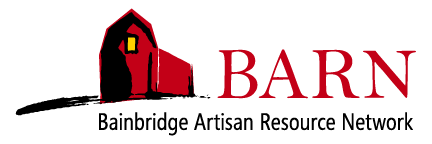
Fiber Arts
Basketry: Women's Work Basket
Learn to weave this traditional Haida basket using red and yellow cedar bark.
Tuition Assistance and Other Policies
Meeting Times
- Fri, 12/1/2023 9:30 AM - 4:00 PM
- Sat, 12/2/2023 9:30 AM - 4:00 PM
Fri, 12/1/2023 - Sat, 12/2/2023
Closed
About
Using carefully prepared strips of red and yellow cedar bark, you will learn how to weave two- and three-stranding twining and the in-between stitch to create this traditional Haida basket used for gathering berries.
Details
- When you register, choose between a small/medium basket ($75) or a large basket ($100). The smaller size is recommended for beginners.
- Students should bring lunch each day. A microwave and refrigerator are available for your use on the lower level.
Project
Class Policies
BARN Policies
- View BARN's Cancellation and Refund Policy.
- Tuition Assistance is available. Fill out the application before registering.
- BARN is committed to accessibility. We try to make accommodations when requested; the earlier you contact us, the more likely we can help. Please email accessibility@bainbridgebarn.org to find out more or request an accommodation.
- Sensory Statement: Makerspaces like BARN can be noisy and cluttered, smell strongly, and have bright or flickering lights. BARN is not an allergen-free facility. If you have concerns, please email info@bainbridgebarn.org.
Instructors or Guides
Lisa Telford


Follow Us